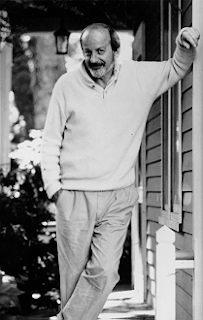Doctorow's brilliant essay --The Unfeeling President --appeared originally in the September 9th issue of the Easthampton Star. Doctorow could not have known then that Dennis Kucinich, having introduced some 35 articles of impoeachment, would now say of our 'unfeeling' President: "There has been a breach of faith between the Commander in Chief and the troops."
There is no denying that the source of Bush's 'unfeeling' is that of an even earlier 'breach of faith' with the American people. One who is morally dead may not feel, may not experience faith. Bush never intended to 'lead' this nation. He intended to destroy it --our Constitution, our heritage, our most cherished traditions, indeed, our lives. Our nation's Constitution, called a 'goddamned piece of paper', is derived from the ancient, venerable notion that the legitimacy of government is its contract with the people. Contracts not supported by faith are not worth the paper they are written on. Bush had in mind his subversion of our charter when in a temper tantrum he screamed the nine words that alone should have impeached and removed him from office: "The Constitution is just a goddamned piece of paper!" The following brilliant and insightful essay by novelist E.L. Doctorow appeared in the Sept. 9 edition of the Easthampton Star.I fault this president for not knowing what death is. He does not suffer the death of our twenty-one-year-olds who wanted to be what they could be.On the eve of D-day in 1944, General Eisenhower prayed to God for the lives of the young soldiers he knew were going to die. He knew what death was. Even in a justifiable war, a war not of choice but of necessity, a war of survival, the cost was almost more than Eisenhower could bear.
Named for Edgar Allan Poe, Edgar Lawrence Doctorow occupies a central position in the history of American literature. On a shortlist that might also include Philip Roth, Toni Morrison, John Updike, Saul Bellow, and Don DeLillo, E. L. Doctorow is generally considered to be among the most talented, ambitious, and admired novelists of the second half of the twentieth century. Long celebrated for his vivid evocations of nineteenth- and twentieth-century American life (particularly New York life), Doctorow has received the National Book Award, two National Book Critics Circle Awards, the PEN/Faulkner Award, the Edith Wharton Citation for Fiction, the William Dean Howell Medal of the American Academy of Arts and Letters, and the presidentially conferred National Humanities Medal.
Doctorow was born in New York City on January 6, 1931, and, like the novelist Everett in City of God, attended the Bronx High School of Science. After graduating with honors from Kenyon College in 1952, he did graduate work at Columbia University and served in the U.S. Army, which stationed him in Germany. In 1954, he married Helen Setzer. They have three children. Doctorow was senior editor for New American Library from 1959 to 1964 and then served as editor in chief at Dial Press until 1969. Since then, he has devoted his time to writing and teaching. He holds the Glucksman Chair in American Letters at New York University and over the years has taught at several institutions, including Yale University Drama School, Princeton University, Sarah Lawrence College, and the University of California, Irvine.
With The Book of Daniel, his third novel, Doctorow emerged as an important American novelist with a strongly political bent. A fictional retelling of the notorious Rosenberg spy case, the novel deftly evokes the complex anxieties of Cold War America, shuttling back and forth in time from the 1950s, when Paul and Roselle Isaacson are convicted and electrocuted, to the late 1960s, when their troubled son, Daniel, a grad student at Columbia, must deal with the consequences of his unusual birthright. The Book of Daniel was adapted in 1983 into the film, Daniel, starring Timothy Hutton and directed by Sidney Lumet. Four years after The Book of Daniel came Ragtime, a dazzling reimagining of the United States at the dawn of the twentieth century by means of a plot that, like City of God, ingeniously brings together real-life figures-such as Henry Ford, J. P. Morgan, Harry Houdini, and Emma Goldman-with an array of invented characters. Ragtime was named one of the 100 best English-language novels of the twentieth century by the editorial board of the Modern Library and was adapted into a successful Broadway musical in 1998. The March was published in 2005.
Widely acclaimed for the beauty of his prose, his innovative narratives, his feel for atmospherics, and above all for his talent for evoking the past in a way that makes it at once mysterious and familiar, Doctorow has created one of the most substantial bodies of work of any living American writer. --Biography of E.L. Doctorow







